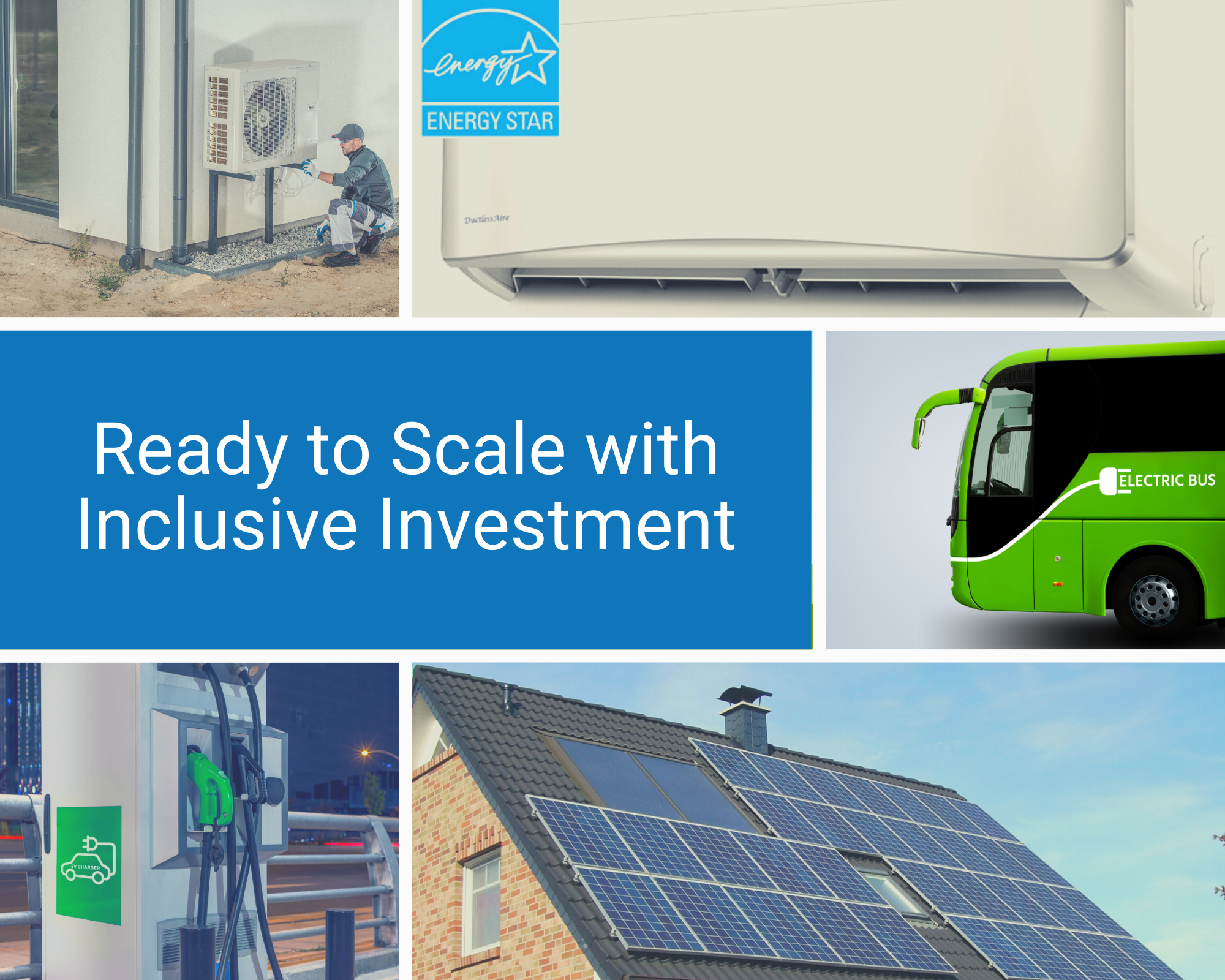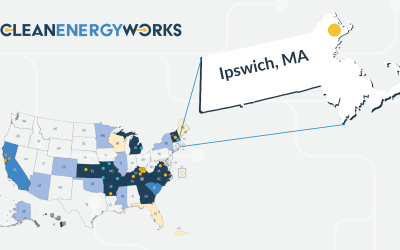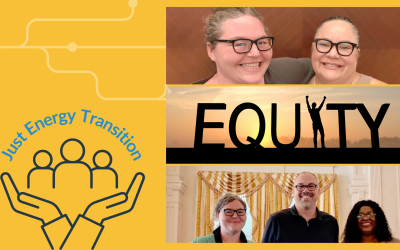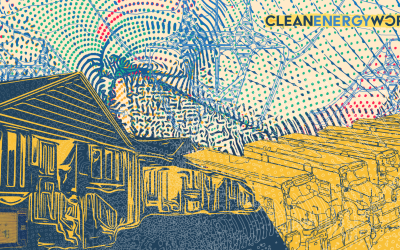Movements for racial equity and climate justice continue to demonstrate the need to accelerate investments in cost-effective distributed energy solutions to open the clean energy economy to all. In 2020, Clean Energy Works made many gains in expanding uses for site-specific utility investment for energy upgrades.
Want to join us in our work for 2021? We’re hiring for a Managing Director.
Research for new applications of inclusive investment
Some of the most exciting undertakings this year were working with partners to undertake research on how inclusive investment can be applied to electrification and solar PV. Through the Building Decarbonization Coalition, we co-authored a report on “Towards an Accessible Financing Solution: A Policy Roadmap with Program Implementation Considerations for Tariffed On-Bill Programs in California”.
This report is a first-of-its-kind roadmap that outlines how low-and moderate-income and renter households across California, which together make up more than 40 percent of the state’s population, can access building upgrades that enable greater access to clean technologies that slash indoor air pollution. Though specific to California, many of the recommendations and implementation pathways could be replicable to other contexts, with New York being a potential fast follower.
Our research on increasing accessibility to solar was published in August as part of our work with the LIFT Solar Everywhere project sponsored by the Department of Energy. This three-part report explored the applicability of Pay As You Save® (PAYS®) for energy efficiency to on-site solar, the regulatory precedents for PAYS at the state level, and possible financial structures that would enable tax-exempt utilities such as rural cooperatives to adapt PAYS to monetize the federal solar tax credit for their members. The next phase of our research with this project aims to characterize feasible transaction paths for Solar PAYS with no customer copayment – with or without reform to the federal solar tax credit.
Continued advances in transportation
From the endorsement of PAYS for Clean Transport by the Global Innovation Lab for Climate Finance in 2018 to the launch of our international program last year, our work on transportation electrification continues to expand. This year saw the completion of our feasibility study in Lima which was supported by a design funding grant from Convergence Blended Finance. The findings from that study informed our work in Bogotá, where together with WRI with the support of the UK government, contributed to the 2019 and 2020 bids for electric buses bringing almost 900 electric buses to the city. Those achievements and our continued engagement in Latin America resulted in Clean Energy Works partnering with C40 Cities and ICCT for the second phase of the ZEBRA initiative.
In the United States, we partnered with Roanoke Electric Cooperative, Fermata Energy, and others to investigate how to best use electric vehicle batteries in ways that can make both EVs and grid services more affordable for all. Using a V2G enabled charger from Fermata, the project seeks to quantify multiple ways this integration can be used, including tapping EV battery storage during periods of peak demand and improving resilience with support for critical loads when backup power systems are needed. The results will be an essential part of the utility’s business case for accelerating investment in transportation electrification.
Expanding the field of inclusive investment champions
Last year, The Southeast Energy Efficiency Alliance (SEEA) formed a Tariffed On-Bill Working Group for implementers to foster peer learning, faster adoption of best practices, and more development of self-serve resources for emerging champions in the field. This year, they released a Utility Guide to Tariffed On-Bill Programs to address practical considerations faced by those charged with developing or improving energy efficiency programs.
Tools like these have been used by champions in North Carolina, Missouri, Georgia, Minnesota and Virginia – all states which have made strides to authorizing inclusive investment pilot programs over the last year. Clean Energy Works has been working with allies in these states to seek that these programs uphold the equitable elements that overcome entrenched barriers such as income, credit score, or home ownership that too often disqualify customers for debt-based financing programs, limiting their ability to access clean energy upgrades.
But that’s not all
Clean Energy Works continues to support philanthropists and advocates who are seeking more equitable approaches to a clean energy transition. We facilitated a delegation of member-owners and to attend the NRECA Annual Meeting in March 2020 and are looking forward to partnering with Neighborhood Funders’ Group Integrated Rural Strategies Group for a webinar in January exploring how to engage with rural electric cooperatives.
Clean Energy Works has also partnered with Chispa, exploring ways to finance electric school buses as part of their Clean Buses | Healthy Ninos campaign. We saw success with this work apparent in a pledge from the Biden-Harris campaign to transition “the entire fleet of 500,000 school buses to American-made, zero-emission alternatives within five years.”
Our work on solar financing also expanded through our involvement with the Achieving Cooperative Community Equitable Solar Sources (ACCESS) project led by NRECA and the Solar Equity Initiative founded by the NAACP, Vote Solar, and United Methodist Women.
What comes next?
The most exciting frontier for implementing inclusive investment programs appears to be in California where a proceeding opened at the California Public Utility commission is exploring options for financing for everything that could be cost effective on the customers side of the meter for residential and commercial buildings, as well as industrial and agricultural customers of investor owned utilities. This proceeding is taking place in the context of strong signals from the state legislature – reinforced by the state’s energy office, the CEC – that addressing the clean energy divide is an imperative for the state to be able to meet its goals for both climate action and advancing equity.
Clean Energy Works is also advancing equity by incubating the Racial Equity in Energy Project (REEP) led by Anthony Kinslow II. REEP is developing an ecosystem designed to give BIPOC CBOs increased access to resources, information, and a support network bolstered with formalized communication and relationships. We look forward to supporting the launch of this project in 2021.
We are delighted to share these glimpses of good news from the field with funders, partners, advisors, and friends, all of whom have helped sharpen and propel the quest to accelerate investment in distributed clean energy solutions on a scale that matters, in a time frame that makes a difference for all.
We’re looking forward to 2021 and collaborating with even more champions to rapidly scale up equitable investment in grid edge solutions. If you are interested in learning more about how to pursue inclusive utility investment, please contact us.




